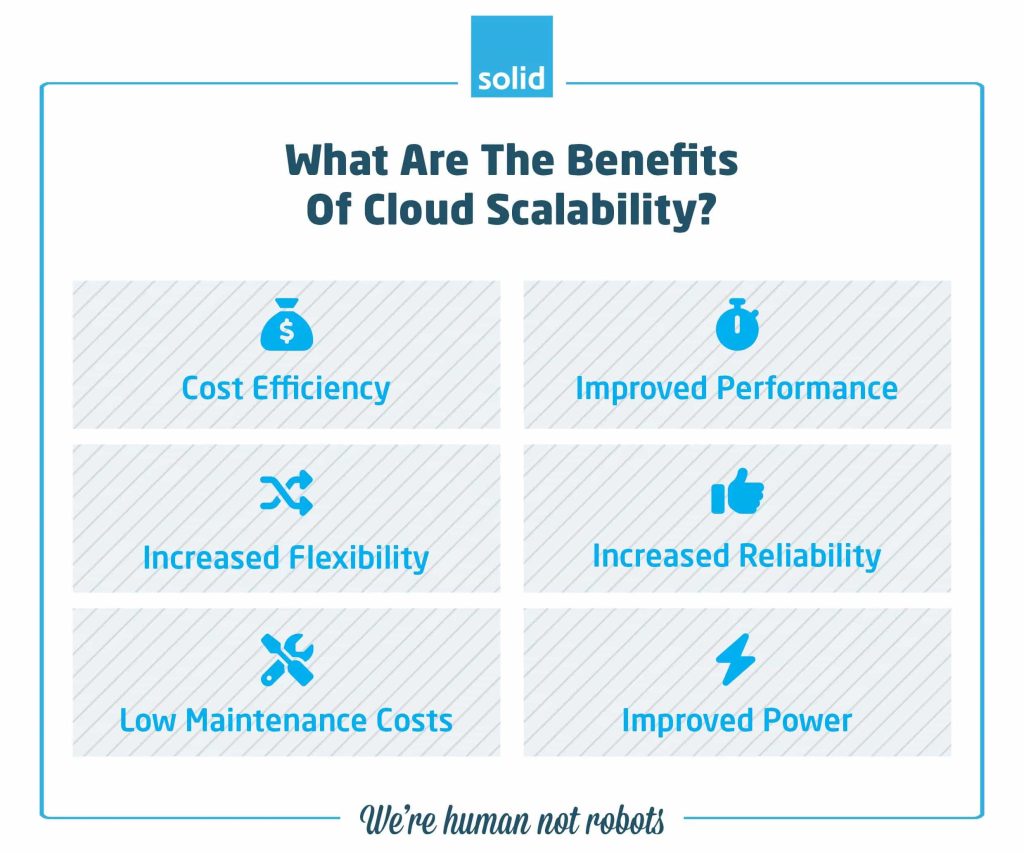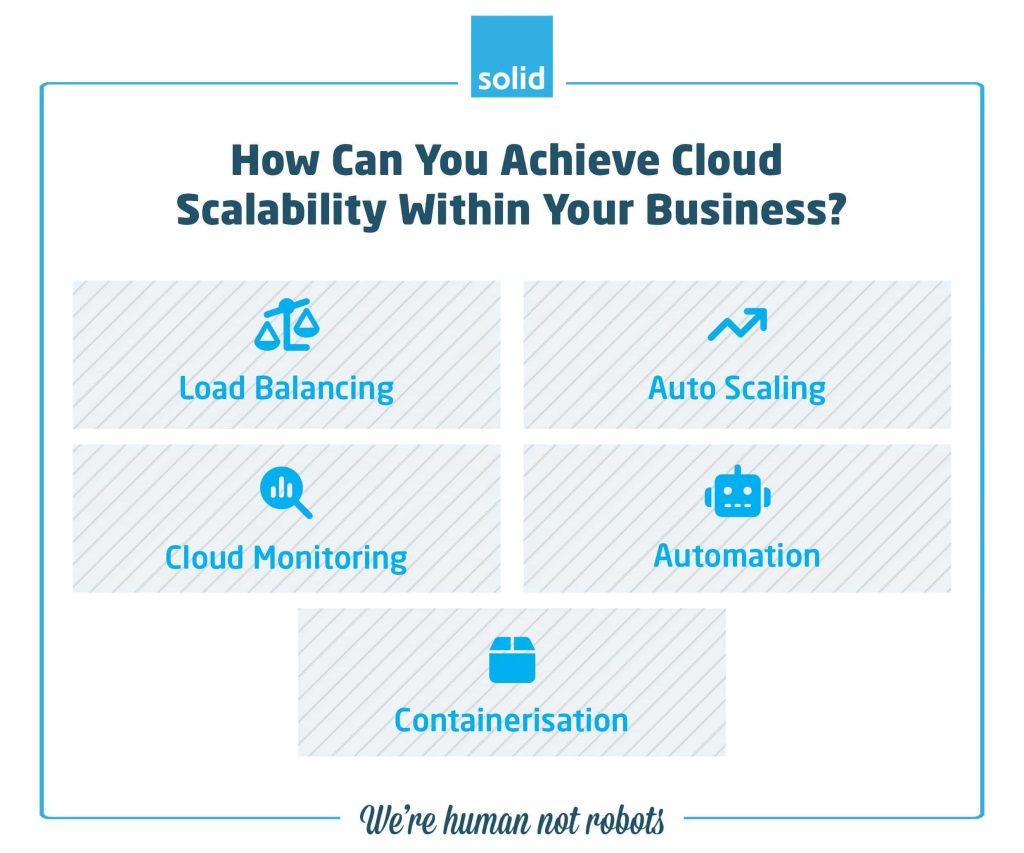
Over the past decade, we have seen more and more businesses adopting cloud services in a variety of different ways. From cloud storage and virtual machines, to productivity and collaboration tools like Microsoft 365, to Cloud VoIP and enhanced security tools, the cloud has plenty to offer to businesses who are looking to maximise their business investments. But as businesses continue to rely more on the benefits of cloud computing, the need for scalable and flexible solutions becomes increasingly important. In this article, we will discuss what some of the cloud scalability benefits are, and how to achieve scalability in your business.
What Is Cloud Scalability?
Scalability refers to the ability of a system or infrastructure to handle increased workloads without negatively affecting performance or incurring unforeseen costs. When looking at what scalability is in cloud computing, it is a vital advantage that enables businesses to scale their operations up or down depending on their needs at any given time. In simpler terms, it means that you can easily adjust and expand your cloud resources as your demands change.
For instance, if you’re running an e-commerce site, you’re likely to experiences fluctuating traffic patterns throughout the year. During peak shopping seasons like Christmas or Black Friday, you’ll almost certain see a spike in traffic as users come to your site to do their festive shopping, or look for the best sales. Cloud scalability means that you can upgrade your resources to ensure an excellent and seamless experience, both for your customers, and for your teams processing those orders in the backend. But you don’t need that extra boost of resources year-round. So once the peak period is over, you can easily downgrade back to your normal capacity. This will see you making the most of cloud resources, while still managing your budget effectively, since there’s no need to pay a premium for the extra processing power when you aren’t using it. This is just one example of the flexibility and adaptability offered by cloud scalability, but there are plenty of advantages for any business that experiences shifting demands, or for a business that is looking their company over the coming months.
What Are The Benefits of Cloud Scalability?

There are plenty of cloud scalability benefits that can have a transformative impact on businesses. Let’s delve into just a few of them:
• Cost Efficiency
One of the main benefits of cloud scalability is the ability to carefully manage your IT budget. By only using the computing resources you need, your business can avoid overspending on idle resources. This means you never have to worry about wasting money on unused servers or storage space, as cloud scalability allows you to easily scale your resources up and down according to demand.
• Improved Performance
With scalable cloud services, you can ensure you have the necessary resources available at all times to meet customer needs. This improves performance and speeds up loading times for critical apps, websites, and services. By being able to quickly scale up during peak periods, you won’t have to worry about slow response times or downtime.
• Increased Flexibility
With cloud scalability, your business can easily adapt and respond to changing market conditions. For example, if there is a sudden influx of customers or orders, you can quickly scale up your resources to meet the demand without any negative impact on your operations. And if you are studying your market and uncover a service offering that you want to pivot towards, the flexibility of cloud services means that you can develop services on cloud infrastructure without it impacting your day-to-day operations.
• Increased Reliability
Another of the great cloud scalability benefits is that it offers improved reliability, since it provides redundancy across multiple servers and data centres. This means that even if a server goes down or experiences issues, your website or app will continue to function smoothly without any interruptions. With high availability and reliability, your customers can trust that they will always have access to your services, and you can trust that your critical data will remain available and that your operations can continue uninterrupted.
• Low Maintenance Costs
Having scalable cloud services means that you are only charged for the resources you use. This means that you don’t have to pay for any additional hardware or maintenance costs associated with traditional on-site servers. Updates and maintenance are handled by a cloud service provider like Solid Systems. This not only saves your business money, but gives your teams more time to focus on the critical areas of your business, and boosts your security, since your systems are only secure when they’re regularly maintenance and updated. Plus, working with Solid Systems as your cloud provider means that you have a wealth of knowledge and experience behind you, giving you peace of mind that your systems are in well-equipped hands.
• Improved Power
By using cloud services, your business can access powerful computing resources that would otherwise be expensive and difficult to maintain. This means that you can process large amounts of data quickly and efficiently, giving you the data you need to make better-informed decisions for your business. With greater computing power at your disposal, you can also run more complex apps and processes without any performance issues. Solid Systems offers advanced cloud solutions that are designed to handle even the most demanding workloads, so you can trust that your systems will always have the power they need to keep up with your business needs.
How Can You Achieve Cloud Scalability Within Your Business?

Now that we understand the benefits of cloud scalability, let’s take a look at how you can achieve it for your business. Here are some key strategies to consider:
• Load Balancing
Load balancing is a technique where workloads are evenly distributed across multiple servers, ensuring that no single server is overloaded with requests. This helps to prevent system crashes and ensures optimal performance, even during peak usage periods.
• Auto Scaling
Auto scaling means that a system can automatically adjust resources based on demand. With this feature, your cloud environment can scale up or down depending on your current needs, ensuring that you only use as much computing power as necessary at any given time, without manual intervention. This improves cost efficiency and also helps to optimise performance levels.
• Cloud Monitoring
Monitoring your cloud environment is crucial for achieving scalability. By closely tracking usage and performance metrics, you can identify areas for improvement and make necessary adjustments to ensure optimal scalability. Solid Systems offers comprehensive cloud monitoring services to help you keep a close eye on your systems at all times.
• Automation
Automation is key to achieving scalability in the cloud. By automating routine tasks and processes, you can free up time and resources for more important tasks. This also helps to reduce human error and improve overall efficiency.
• Containerisation
Containerisation is a popular technique used to achieve scalability in the cloud. It involves packaging apps into segments, which can be easily moved between environments, making it easier to scale up or down as needed. This approach also helps to improve reliability and reduce maintenance costs.
How Can Solid Systems Help
At Solid Systems, we understand the importance of cloud scalability for businesses looking to grow and thrive in today’s digital landscape. As a reliable cloud services and technology partner with over 20 years of experience, we know that your business has unique needs from your cloud services. This is why we work with you to create a strategic technology plan that will see you making the most of your cloud solutions and being able to scale them as your needs change and evolve. Our team of experienced and qualified IT Pros work with you to design and implement a customised strategy that meets your unique needs, and sees you not just reaching, but exceeding your goals. With our exceptionally human support, you can be confident in the scalability of your cloud environment and focus on driving your business forward.
If this sounds like the kind of technology partner that you need in your life, schedule a free consultation with our Sales team today, and let’s get you set up with scalable and reliable cloud services.
Frequently Asked Questions
Cloud computing greatly enhances scalability by providing on-demand resources and services. It allows for the quick upgrading and downgrading of IT resources based on demand, effectively meeting the changing needs of businesses. With cloud computing, companies can scale up to handle peak loads and scale down when these resources are no longer needed, without the need for significant hardware or infrastructure investments. This offers a huge advantage, especially for businesses with fluctuating or growing demands, as they can adjust their capacities without any downtime or service interruption.
Scalability in cloud computing refers to the ability of a system or service to handle increasing amounts of work, data, and users without compromising performance. It is a critical aspect of cloud computing as it enables organisations to adapt quickly to changes in demand and maintain seamless operations. In simpler terms, scalability allows businesses to grow and evolve their IT infrastructure as needed without any major disruptions or added costs.
Cloud scalability is crucial for businesses looking to grow and remain competitive in today’s fast-paced, technology-driven world. It allows companies to easily adapt to changing demands, whether it be sudden spikes in traffic or increased data storage requirements. This helps businesses avoid downtime and service interruptions, ensuring their services are always available to customers, and optimising business continuity. Plus, with scalability comes cost efficiency, improved performance, increased flexibility, reliability and low maintenance costs.
Popular Searches
- Cloud Computing and Cloud Infrastructure
- 8 Benefits of SaaS
- Risk Mitigation Strategy
- Business Cyber Hygiene
- Cloud Migration Strategy Impact
- Maintain Data Integrity
- Cloud Computing for Small Businesses
- Benefits of Network Monitoring
- Cloud Access Security Broker
- Channels of Communication
- Data Migration
- Microsoft 365 Productivity Tools
- What is Cloud Computing?





